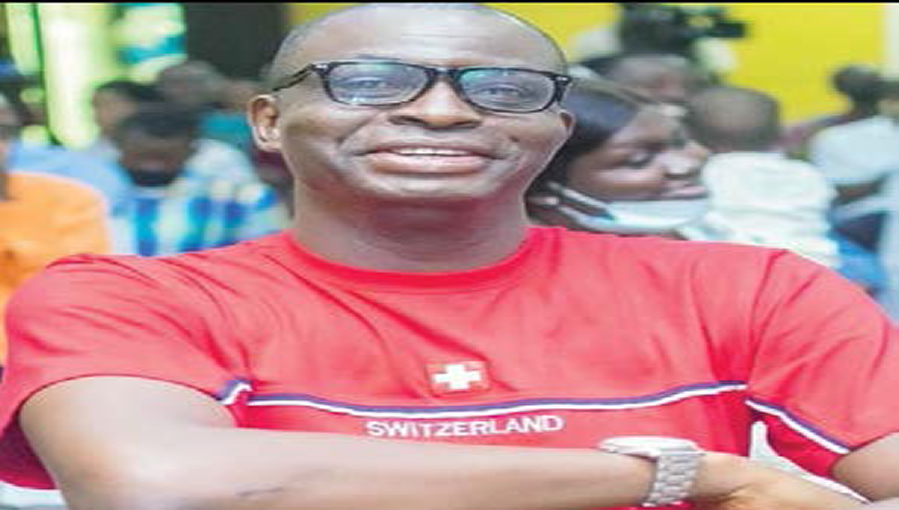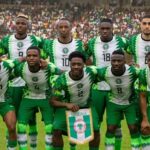
Sports journalist Godwin Enakhena, in this interview, takes ANTHONY NLEBEM down memory lane on why he couldn’t play football professionally, his successful career, challenges and more
How did your journalism career begin?
My journalism career started way back in Agenebode, Edo State while I was in St Peters Grammar School, but it began to make meaning to me when Complete Football magazine published one of my articles in 1987. This was a year after I had left school and after loads of articles I had sent to them were not published. But I kept believing that I would get to read one (of my articles) someday, and it happened. I never stopped writing because it had moved from being a passion to a profession when my paths and that of Paul Bassey crossed in Agege, Lagos State. The rest, like they say, is history.
What influenced your decision to take a career in journalism?
It was accidental because I think it came naturally, I mean writing. My late dad wanted me to be an engineer fixing bicycles in the village as it was a lucrative job then. Sports Journalism was made easy because I played football, which was like a matter of life and death for me. I had developed the habit of reading the backpages of newspapers a lot and was always thrilled seeing bylines of persons I didn’t know from Adam and I wanted to be like them. I wanted people to also read my stories.
Aside football, were you involved in other sports while in school?
Of course. I ran, jumped and played football but I excelled in football. I couldn’t play the game for long and professionally because my father rained curses on me daily because he felt I was going to end up badly. As you know, only those they thought could never do well were involved in sports in those days. My mum pleaded with me to stop football because she was afraid that the curses would affect me. I loved my mum so much that I remember crying on her laps and promising her that I’ll never play the game I loved again on a cold night in Agenebode in 1984. So, that was how my football career ended. Make no mistake, my dad wanted the best for me, he wanted me to concentrate on my education and end up as an engineer. Football for him was one big distraction and because I had refused to stop despite the bearings, he resorted to curses.
What was the experience like in your early days of journalism?
The early days were very challenging, but with the grandmaster Paul Bassey as mentor and boss leading me by the hand, I learned quickly and survived. Can you imagine sourcing stories in those days without telephones, the internet and DSTV? Can you beat that? We had people waiting to read and listen to us every day and we couldn’t afford to fail them. Again, I was fortunate to have had the privilege of starting from print to TV and then radio. By and large, the biggest challenge was relying solely on some crude and very traditional means of having to travel long distances to conduct interviews or going to the homes of the few rich men, who could afford satellite facilities, for news.
You became very popular with your style of presenting sports news. How were you able to do this?
For a village boy from Agenebode to hold his own and stand out in an industry with Goliaths I knew I had to do something different. I decided to freestyle during my presentations, keeping it simple, creating programmes that appealed to the old and young, educated and those who are not literate. I sometimes talked about societal issues and relationships; all in a sports show. Strange for some people, but it worked. The good thing is that the reception has been amazing. I simply carved a niche for myself.
Has it been easy remaining one of the best in the sports journalism industry in the country?
I don’t know if I am one of the best because I’m just doing my thing, doing what works for me and trying to be uniquely different, refusing to be stereotyped. It’s really been easy doing what comes to me naturally. It’s been fun.
Can you share with us some of your funny moments inside the studio while presenting sports?
(Laughs) Let me try and remember, you know it’s been a long journey. Okay, we were on the set of Master Sports, the foremost live show on the Nigeria Television Authority then, when the backdrop came down on us, but thank God for our producer/director, Tanko Yunusa Abdullahi, who took control and ensured that the world saw little or nothing about the near disaster in the studio.
You’ve also veered into football and basketball administration. How has the experience been?
Very good, bad and ugly. I learned the hard way that football administration in Nigeria is not for the faint-hearted. There are three things I won’t forget in a hurry as an administrator: The first was as Chairman of MFM FC. I helped them gain promotion from the amateur division to the topflight Nigeria Professional Football League, fighting one of the biggest battles of my life to ensure that MFM didn’t go on relegation and coping with the shenanigans in Nigerian football.
What are your most memorable moments in journalism?
One became famous, the profession opened doors when what began as passion started putting food on the table, when people you don’t know want to be your friends, and when renowned filmmaker, Tunde Kelani, walked into the live studio at Lagos Television, was fascinated by my presentation and gave me a role in one of his films, Maami! The downside is that being a celebrity puts you under tremendous pressure from people who believe that your being on TV or radio means you are rich and that you should help them financially.
How did you feel watching the 2022 World Cup in Qatar without the Super Eagles?
It was one of the worst moments of my life. Until the World Cup started and ended, it still looked like a dream, it ended as one bad dream that I didn’t want to wake up from. But it’s what it is, we didn’t go to Qatar and many of us lost good money that would’ve come from sponsorships. It’s a terrible experience because the sponsors were just waiting for the Super Eagles to qualify. In fact, we all took qualification for granted but it ended in premium tears, sponsors kept their money while we watched the World Cup on TV back home. Sad.
In the 80s and 90s, Nigerian football was top-notch with players discovered from our local leagues, but that has changed. What do you think is the cause?
You can’t separate the ills in the larger society from the ills in sports in Nigeria. Fix Nigeria and sports will thrive again.
What’s your opinion about the influx of players born abroad in the Eagles?
I have never had issues with players who have Nigerian blood in their veins turning out for the Super Eagles. I only get angry when average players are invited to displace the few good ones from the domestic league. I want to believe that the Nigeria Football Federation under Ibrahim Gusau will put an end to this.
Do you think our topflight domestic league, which resumes on Sunday, is on the right path?
An Interim Management Committee has been saddled with the responsibility of running the league for the next six months, they’ve started work and I wish them well. That said, 18 clubs out of 20 run by state governors tells us that we are joking. Governments at the federal and state levels should follow the Lagos State template of providing infrastructure and an enabling environment for sports to thrive, these are their roles.





